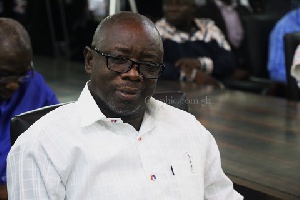The Ghana Chamber of Mines has reiterated the commitment of member companies to the country’s local content agenda in order to help boost local economic growth.
Mr Alfred Baku, Vice President, Ghana Chamber of Mines, said the commitment was to develop a locally integrated business network that would lower the cost of production and create opportunities to spawn other businesses to support national development.
To do this, member companies proactively engage stakeholders to help build the management and technical capacity of local suppliers in the mining supply chain.
Mr Baku said this in a speech delivered at a Local Content Workshop organized by the Chamber for stakeholders to deliberate on local content in the mining industry.
It was on the theme: “Harnessing the Opportunities within the Mining Industry’s Local Content: The Journey so Far and Way Forward” and seeks to chronicle the eventful path the industry has crafted since the implementation of the local content policy.
Mr Baku said despite the unique challenges, such as high cost of production, fluctuations in the gold price, environmental and security challenges, the sector continues to be a key enabler of industrialization and broad-based economic development in Ghana.
For instance, in 2018, the sector contributed 9.8 per cent to GDP compared to 7.3 per cent in 2017, making it the fourth-largest economic sector by value.
Proceeds from the export of minerals also accounted for 39 per cent of gross merchandize exports, making it the foremost source of export earnings for the economy.
Producing member companies’ share of mineral revenue returned to the country increased from 70 per cent in 2017 to 75 per cent in 2018.
Besides, Mr Baku said, the contributions made by the mining industry, the Chamber and its member companies had taken various initiatives to source inputs and services from the local economy.
To do this, member companies proactively engage stakeholders to help build the management and technical capacity of local suppliers in the mining supply chain.
Mr Baku said the implementation of the Procurement List and the Local Content Initiative in general, would succeed if the initiative had the required support from all key stakeholders, including government, the Minerals Commission and local suppliers as well as banks.
“It is my expectation that the Minerals Commission and other stakeholders will collaborate with the mining industry so that together we can realize the objectives of the legislation on the local content, which in summary, is to grow Ghana’s manufacturing capacity on the back of the mining industry,” Mr Baku added.
On his part, Mr Sulemanu Koney, the Chief Executive Officer of the Ghana Chamber of Mines, said local content is a critical factor in harnessing the inherent value from value chain of the mining industry for broad-based socio-economic development.
He said the producing members of the Chamber spent $1.4 billion on local procurement of goods and services in 2018.
He said it was the desire of members to see manufacturing and fabrication firms as well as engineering services companies set up in Ghana to offer services to the mining industry in Ghana and expand to serve mining firms in West Africa.
In a speech read on his behalf, the Minister of Lands and Natural Resources, Kwaku Asomah-Cheremeh, said local content and value addition had become an integral part of the strategies that resource-rich countries had adopted to increase the benefits from resource extraction and stimulate broad base growth beyond securing optimal rents, royalties, taxes, shares and other revenues.
“Indeed, the goal of the local content strategy is to promote linkages with other sectors of the economy through local employment opportunities, local manufacturing of inputs, in-country spending on local procurement of goods and services, technology and skills transfer on local participation through equity and management”.
He said that the government recognizes that for the mining sector to improve its contribution to broad base development, it must be better integrated into the national and event regional economic fabric through linkages, as stipulated in the African Mining Vision.
Business News of Thursday, 24 October 2019
Source: ghananewsagency.org
Ghana Chamber of Mines reiterates commitment to local content agenda
Entertainment












